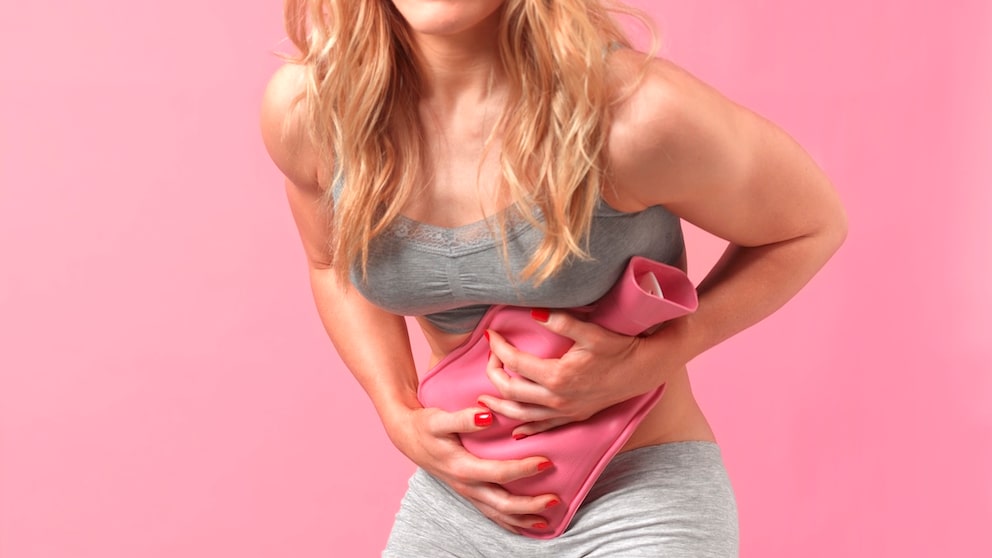April 26, 2025, 8:55 am | Read time: 4 minutes
Endometriosis affects millions of women worldwide. Due to the pain that most experience in their daily lives, many turn to painkillers and other medications. However, it’s not always necessary to reach for a pill; a change in diet can also help reduce pain over the long term.
In endometriosis, benign tissue similar to the uterine lining grows outside the uterus. It can form on the ovaries, in the abdominal and pelvic areas, on the intestines, and in the peritoneum.1 This often leads to pain for those affected — even outside their menstrual period. However, these pains caused by endometriosis can be countered with the right diet.
Overview
Diet as an Alternative Treatment for Endometriosis Pain
Endometriosis is a chronic inflammatory condition where tissue similar to the uterine lining grows outside the uterus. In addition to unbearable pain, fatigue, infertility, and gastrointestinal issues — such as bloating — are among the most common symptoms. Current treatment options mainly focus on hormonal therapies or surgeries. Many affected individuals, therefore, seek alternative relief methods—such as diet. It is known that diet can influence the gut microbiome, which in turn plays a role in inflammation and pain. The aim of this survey was to determine which specific dietary changes and supplements affected individuals find helpful against pain — and how widespread these measures actually are.
Survey with Affected Individuals
The study was based on an online survey with 24 questions, developed in collaboration with a local endometriosis support group.2 It asked for information about endometriosis and diet. Participants were also asked to rate their pain on a scale from zero to ten. The survey was offered on a specialized platform and ran from June 10 to September 2, 2022. A total of 2,858 people started the survey, and 2,599 answered more than 80 percent of the questions. Of these, 2,388 reported having a medically confirmed diagnosis of endometriosis. The results were then analyzed using standard statistical methods.
Diet and Endometriosis Pain Linked: Changes Can Reduce Pain
Of the 2,388 participants with confirmed endometriosis, 2,001, or 83.8 percent, had tried at least one change to their diet to alleviate their pain — two-thirds reported an improvement in their pain. Nearly 60 percent of the participants relied on supplements, with almost half of them noticing an improvement.
The most common restrictions were:
- Alcohol reduction (1,252 people): 666 reported improvement (53.2 percent)
- Gluten reduction (1,151 people): 523 noticed improvement (45.4 percent)
- Dairy reduction (1,132 people): 512 with positive feedback (45.2 percent)
- Caffeine reduction (1,091 people): 473 reported less pain (43.4 percent)
Among supplements, magnesium was most frequently mentioned (812 users), with 262 (32.3 percent) reporting pain improvement.
What Do the Results Mean?
The results show that many women with endometriosis actively seek alternative ways to alleviate their symptoms — and many subjectively benefit from dietary changes or supplements. Notably, most measures perceived as helpful were not based on complex diet concepts but on the reduction of individual foods such as alcohol, gluten, dairy, or caffeine. These findings could provide starting points for further clinical studies to systematically investigate the effectiveness of such measures. It is important to note that not every measure was helpful for every participant — the individual response seems to play a significant role. Additionally, the study shows that many affected individuals seek information through social media or medical professionals, highlighting the importance of evidence-based education.
Study Context
The study provides valuable insights but is not without limitations. As it is an online survey, there is a certain selection bias: participants were likely those already interested in dietary topics. Additionally, the questionnaire was only available in English, which may have made participation difficult for non-English speakers. It also remains unclear how long the individual diets or supplements were used and how significantly they affected other symptoms like bloating. Importantly, the results are based on self-reports — a placebo effect cannot be ruled out. Despite these weaknesses, the large number of participants is a major advantage, as is the detailed assessment of perceived pain changes.

This Diet Can Reduce Pain in Endometriosis Patients by 50 Percent

Red or White? One Type of Wine Increases the Risk of Skin Cancer

Vary Push-up Training with a Balance Board
Conclusion
The survey shows that many individuals with endometriosis perceive an improvement in their pain through targeted dietary changes or supplements. Alcohol, gluten, dairy, and caffeine were particularly often reduced — with sometimes remarkable success. The results suggest that personalized dietary recommendations could be a promising therapeutic approach that should be further explored.

